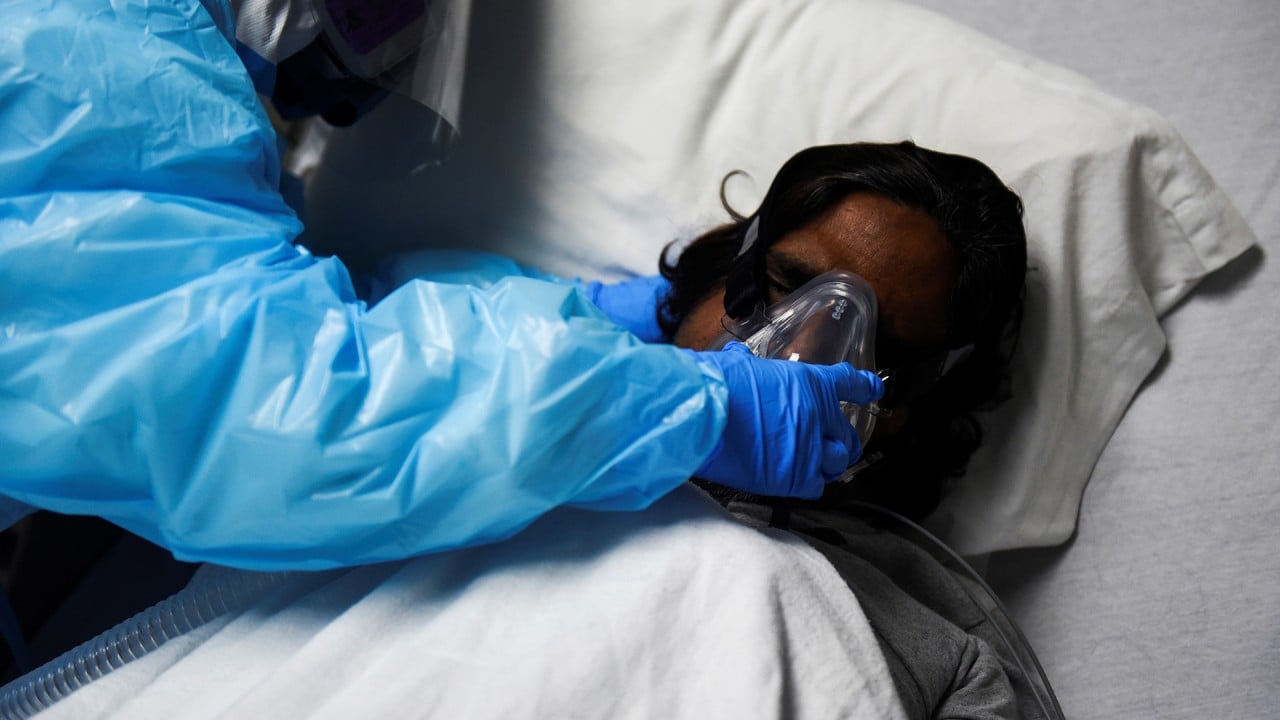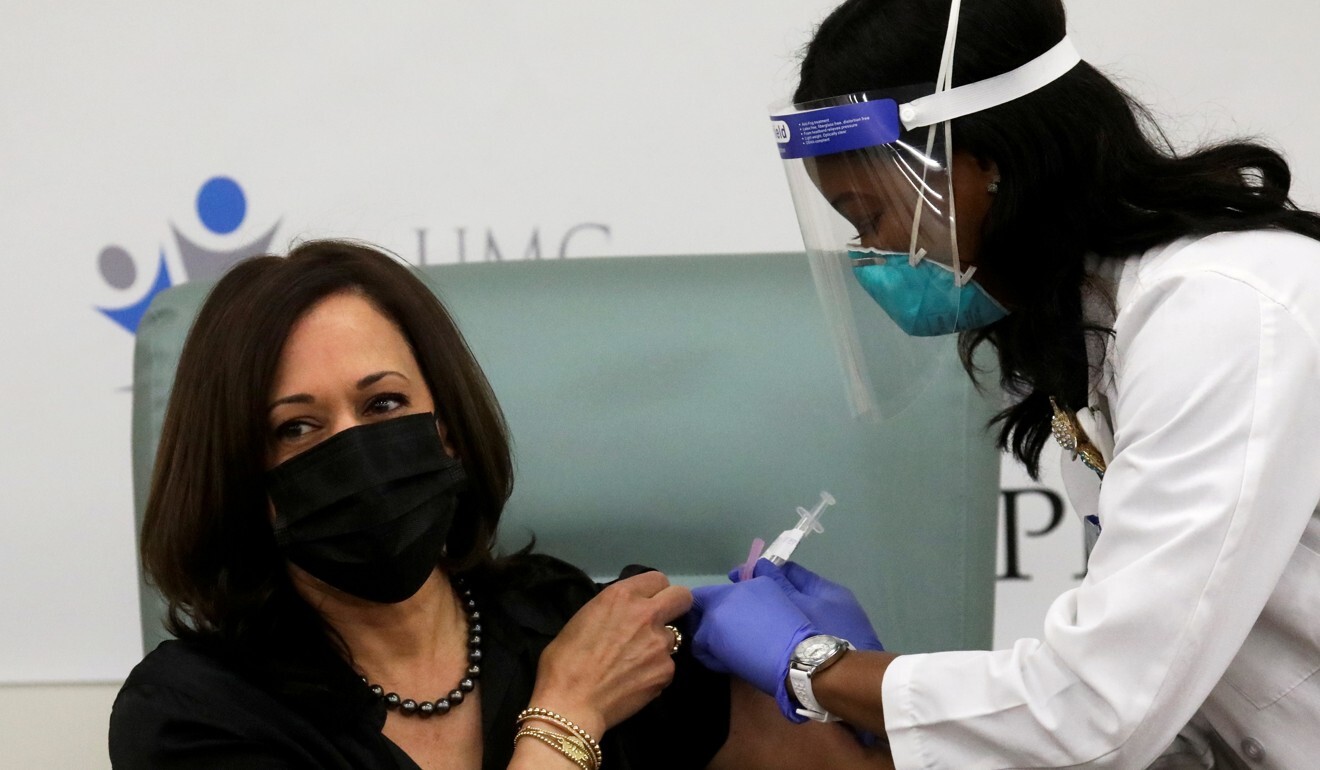
Coronavirus: Britain approves AstraZeneca-Oxford vaccine as new strain spreads across world
- Britain will become the first nation to roll out the jab on January 4
- Further swathes of country likely to be placed under stricter restrictions
The pandemic has already killed almost 1.8 million people around the world, sown chaos through the global economy and upended normal life for billions since the coronavirus was first detected in Wuhan, China, a year ago.
Britain and South Africa in particular are grappling with new variants of the coronavirus, which the government and scientists say are more contagious; many countries have responded by banning passenger flights and blocking trade.
AstraZeneca and other developers have said they are studying the impact of the new variant but expect that their shots will be effective against it.
‘It was unbearable’: hundreds of UK tourists flee Swiss quarantine
Britain will become the first nation to roll out the jab on January 4, Health Secretary Matt Hancock said, amid mounting concerns that another dangerous spike in infections threatens to overwhelm the NHS.
Prime Minister Boris Johnson called it “truly fantastic news” and “a triumph for British science”.
“We will now move to vaccinate as many people as quickly as possible,” he tweeted.
The vaccine can be stored, transported and handled at normal refrigerated conditions, and is therefore cheaper and easier to administer than the Pfizer-BioNTech and Moderna jabs that require freezing.
The vaccine will now become the second Covid-19 vaccine in use in Britain. On December 2, regulators gave similar emergency authorisation to the Pfizer-BioNTech vaccine.
AstraZeneca chief executive Pascal Soriot called the approval “an important day for millions of people in the UK”.
He predicted trials would show his firm had achieved a vaccine efficacy equal to Pfizer-BioNTech at 95 per cent and Moderna at 94.5 per cent. Earlier trials had shown varying outcomes in the AstraZeneca shot’s efficacy.

AstraZeneca’s vaccine can be 80 per cent effective when there are three months between shots, an official said, but there is insufficient evidence to back a regime involving a half dose.
“Effectiveness was high, up to 80 per cent, when there was a three-month interval between first and second doses, which is the reason for our recommendation,” Munir Pirmohamed, Chair of the Commission on Human medicines expert Working Group on Covid-19 vaccines, said.
“We also looked at the half dose regimen, which has been publicised quite widely, but we felt that the results were not borne out by the full analysis,” he said.
The approval of AstraZeneca’s vaccine came as British officials were considering tougher coronavirus restrictions as the number of hospitalised Covid-19 patients surpasses the first peak of the outbreak in the spring.
Authorities have blamed the new, more transmissible variant of the virus, first identified in southeast England, for the soaring infection rates.
An area home to almost half of the people in England is under tight restrictions on movement and everyday life in an attempt to curb the spread of the virus.
Non-essential shops are shut along with gyms and swimming pools, indoor socialising is barred and restaurants and pubs can only offer takeaway.
Hancock said the Midlands, the northeast, parts of the northwest and parts of the southwest will be put into Tier 4 – the top level of lockdown measures – from 00.01 on Thursday. Hospitality venues and non-essential shops are closed in tier four and households cannot mix.
Hospitals in the worst-hit areas of London and southern England are becoming increasingly overstretched, with ambulances unable to unload patients at some hospitals because all beds are full. A growing number of National Health Service staff are off work because they are sick with the virus or self-isolating.

03:10
‘Every day we struggle’, doctors overwhelmed treating Covid-19 cases in hospitals around the world
England had 20,426 coronavirus patients in hospitals as of Monday morning – the last day for which figures are available – compared to its previous high of 18,974 on April 12. Britain has recorded more than 71,000 confirmed coronavirus deaths, the second-highest death toll in Europe after Italy.
A further 414 deaths were reported Tuesday, along with a record 53,135 new cases, although that figure may include a backlog from the Christmas holiday period. In Switzerland, a person who was among the first in the country to be vaccinated with a Covid-19 shot later died, officials in the canton of Lucerne said on Wednesday, though they did not indicate whether the death was related to the inoculation. “We are aware of the case,” a spokesperson said, adding the matter had been referred to Swiss drugs regulator Swissmedic.
China will need an army of vets to defend against future pandemics
The Rocky Mountain state of Colorado recorded what is believed to be the first case in the United States – which has suffered the highest death toll of the year-old pandemic. Nearly 338,000 people have died of Covid-19 in the US.
Governor Jared Polis said a man in his 20s near Denver was infected with the variant known as B.1.1.7 and is isolating.
US President-elect Joe Biden, after a briefing from experts, warned that the dire Covid situation may not ease up until “well into March”.
“The next few weeks and months are going to be very tough – a very tough period for our nation, maybe the toughest during this entire pandemic,” he said.
Hospitalisations are back at an all-time high in the US at more than 121,000 as of Monday.
In Los Angeles, ambulances waited all day to unload Covid patients, with more than 95 per cent of hospitals forced to divert new cases away, and one reportedly treating patients in its gift shop and chapel. Southern California extended a three-week old lockdown indefinitely Tuesday.
Biden called mass vaccination the “greatest operational challenge we’ve ever faced as a nation” – and promised the US would do better after he replaces defeated President Donald Trump on January 20.
“The Trump administration’s plan to distribute vaccines is falling far behind,” Biden said, promising: “I’m going to move Heaven and Earth to get us going in the right direction.”
The Trump administration had predicted that 20 million Americans would be vaccinated by the end of December.
With days left, some 2.1 million have received the first shot of the vaccine, according to the Centres for Disease Control and Prevention.
Almost 1.8 million dead, but future pandemics could be worse
Biden renewed his promise to administer 100 million vaccine doses in his first 100 days in office and confirmed he would invoke a Korean war-era law to force private industry to step up production.
With health workers desperately waiting, politicians have been among first to be vaccinated in a stated goal of setting an example, with Vice President-elect Kamala Harris taking her first dose Tuesday before cameras in Washington.
Matthew W., a nurse at two different local hospitals, said in a Facebook post on December 18 that he had received the Pfizer vaccine, telling the ABC News affiliate that his arm was sore for a day but that he had suffered no other side-effects.
Six days later on Christmas Eve, he became sick after working a shift in the Covid-19 unit, the report added. He got the chills and later came down with muscle aches and fatigue.
He went to a drive-up hospital testing site and tested positive for Covid-19 the day after Christmas, the report said. Christian Ramers, an infectious disease specialist with Family Health Centers of San Diego, told the ABC News affiliate that this scenario was not unexpected.
“We know from the vaccine clinical trials that it’s going to take about 10 to 14 days for you to start to develop protection from the vaccine,” Ramers said.

As conspiracy theories spread on the internet, a new poll by Ipsos Global Adviser showed that just four in 10 people in France want to get vaccinated, a figure that is only slightly higher in Russia and South Africa.
In South Africa, which has recorded more than 300 cases of the new variant and is the first African nation to hit one million cases, the government banned the sale of alcohol and made masks compulsory in public.
Philippines bans travellers from 20 nations with UK variant detected
“We have let down our guard, and unfortunately we are now paying the price,” said President Cyril Ramaphosa.
Chile on Tuesday became the first Latin American country to detect the new strain, in a woman who returned from Madrid after also visiting Britain and Dubai.
In response, health authorities announced a 10-day quarantine from December 31 for all arrivals.
The new strain was also detected in the United Arab Emirates and India, which has the second-biggest caseload in the world.
Worrisome trends have been increasing worldwide, with South Korea – hailed for its early success – logging its highest daily death toll yet.
And Moscow reported a 27 per cent increase in fatalities in the capital from October to November – a day after Russia admitted its number of Covid-19 deaths were more than three times higher than previously reported.
Reuters, Associated Press and Agence France-Presse
